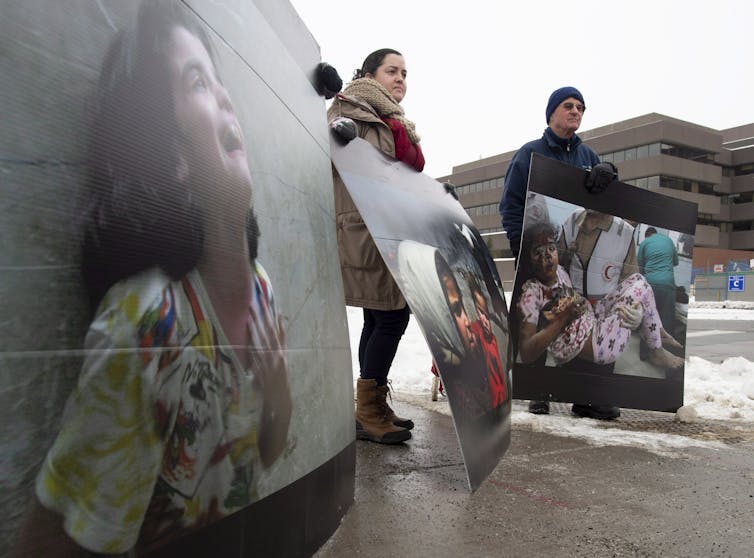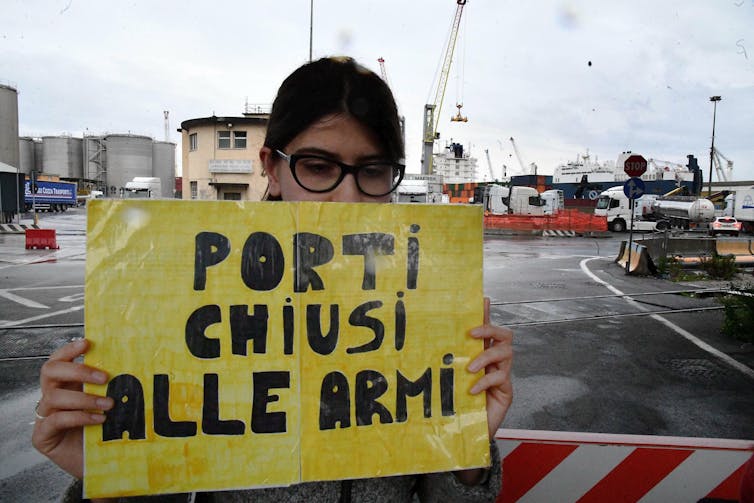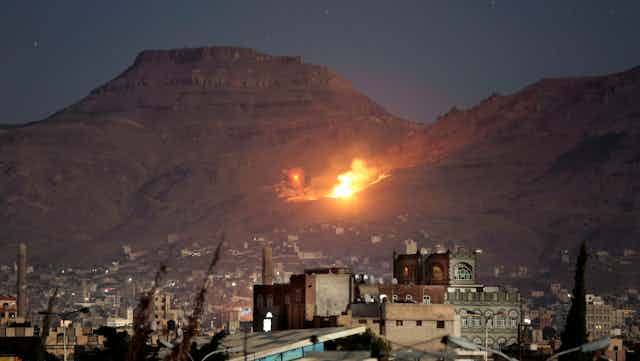As Canada’s largest labour organization and the political arm of the labour movement, the Canadian Labour Congress (CLC) has long been a voice for peace, human rights and social justice.
But on one of the most controversial issues in Canadian politics, Canada’s arms deal with Saudi Arabia, it has failed to take a meaningful stand.
Saudi Arabia and its coalition partners are waging war in Yemen. The war has plunged the country into what the United Nations calls “the world’s worst humanitarian crisis.”
According to a recent UN report, approximately 70,000 Yemenis have died since the beginning of 2016. Hospitals, schools, markets and mosques are common targets for Saudi coalition airstrikes.
Read more: Explained: how the Arab Spring led to an increasingly vicious civil war in Yemen
Two thirds of the Yemeni population require humanitarian support or protection, 17 million are food insecure, three million have fled their homes and 14.5 million require access to safe drinking water. And as UN Women has found, women and girls bear the brunt of this devastating situation. A 2018 report of the UN High Commissioner for Human Rights concluded that violations and crimes under international law have occurred and continue to be perpetrated in Yemen.
Canada’s complicity
Canada is complicit in the war in Yemen. The export of made-in-Canada light armoured vehicles (LAVs) to Saudi Arabia, an approximately $15-billion contract originally signed by the Conservative government of Stephen Harper, is now proceeding under export permits approved by the Liberal government of Justin Trudeau.
New export permits for arms shipments to Saudi Arabia have reportedly been suspended pending an indefinite review by the Trudeau government following the murder of Saudi journalist Jamal Khashoggi. But according to recent data from Statistics Canada over half a billion dollars worth of armoured fighting vehicles have been exported through the port of Saint John, N.B., to Saudi Arabia in 2019 alone.
There is credible evidence that Canadian weapons sold to Saudi Arabia are being used in the devastating war in Yemen. The Saudi-led coalition continues to commit serious violations of international humanitarian and human rights law in Yemen, and Saudi Arabia also has a persistent record of serious violations of the human rights of its own citizens.
Where’s the Canadian labour movement?
In April 2016, the CLC — as part of coalition of human rights, development and arms-control groups — endorsed an open letter to Trudeau that expressed profound concerns about issuing export permits for Canada’s arms deal with Saudi Arabia, “despite flagrant incompatibilities of this contract with the human rights safeguards of our export controls.” The letter urged the prime minister to rescind this “immoral and unethical” decision.
Since then, the silence of the CLC has been deafening.
On this issue, Canada’s labour movement is uniquely situated to bring pressure to bear on the government. While Amnesty International, Oxfam Canada and other civil society organizations have called for the cancellation of the arms deal via the open letter, it is unionized Canadian workers in manufacturing plants, on railways and in ports who have the real power to stop the production and shipment of arms to the Saudi regime.

In the face of the global climate and migration crises, and in an era in which right-wing politicians demonize migrants and refugees while pushing an agenda of austerity, environmental destruction and war that drives displacement and migration, the CLC must stand for a green, peaceful socially just economy. Good jobs must not depend on developing, building and shipping machinery used to make war.
After all, manufacturing, rail and dock workers would likely prefer to be working on and transporting products central to the fight against climate change than weapons of war.
Dockworkers lead the way
Labour can and must be a voice for peace. Working with peace activists and human rights organizations, unions in Denmark, Finland, Germany and Norway have successfully pressured their respective governments to suspend Saudi arms transfers.
And in the past few weeks, union dockworkers in the Italian port of Genoa and the French port of Marseilles made international headlines when they refused to move, load or help ship military cargo destined for Saudi Arabia.

Here in Canada in late December 2018, members of the International Longshoremen’s Association Local 273 courageously refused to cross a picket line at the Saint John port where peace activists had assembled to protest the arrival of a Saudi cargo ship scheduled to transport Canadian-made LAVs to their destination in Saudi Arabia. Yet unlike union dockworkers in Europe, Local 273 received little in the way of solidarity from other unions.
The CLC must be a voice for peace and human rights and demand that the Canadian government immediately cancel its arms deal with Saudi Arabia and use its considerable resources to co-ordinate labour movement opposition to the deal. Yemen can’t wait.

